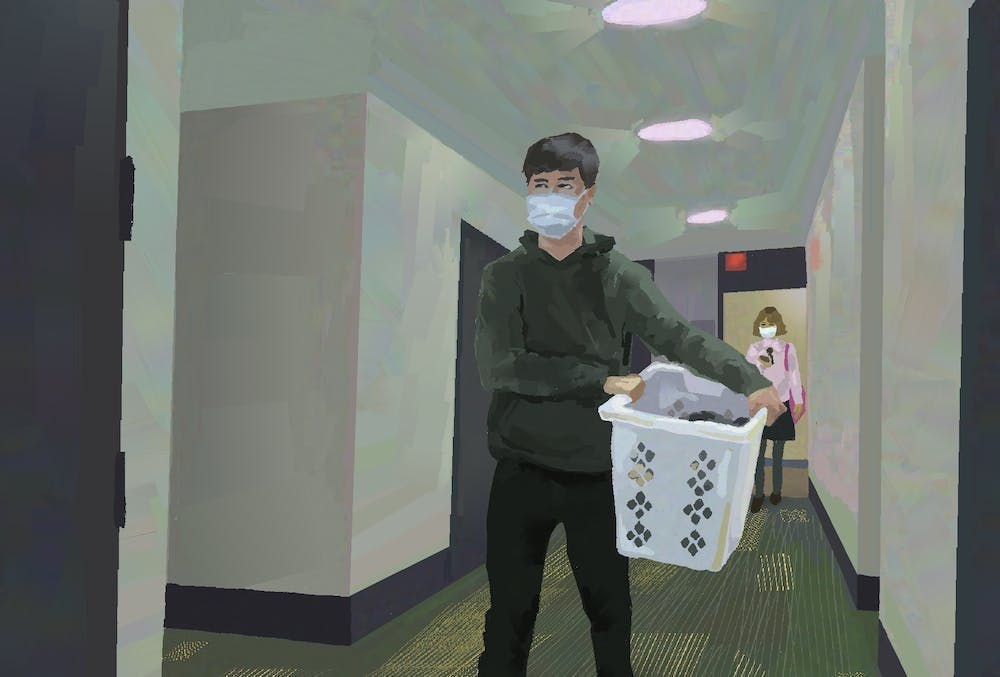Hardly three weeks after setting up his dorm room in Marcy House for the start of the fall semester, Oliver Villanueva ’25 found himself moving many of his belongings for a second time after his roommate tested positive for COVID-19. When he learned his friend Eric Ma ’25 also had a COVID-positive roommate, they came up with a solution: a room swap, where Villanueva would stay in Ma’s room and their COVID-positive roommates would stay in Villanueva’s room for the remainder of their isolation period.
“It was definitely a hassle,” Ma said. They had to move more than five days’ worth of clothes as well as sheets and comforters between the two dorms, all while two of the four roommates had COVID-19, he said.
The University has shifted to treating COVID-19 like “other infectious diseases,” Vanessa Britto MSc’96, associate vice president for campus life and executive director of health and wellness, wrote in an email to The Herald.
Because COVID-19 is so widespread, the University now focuses “on preventing major outbreaks and instances of severe illness or hospitalization,” Britto wrote. When asked about the current number of cases on campus by The Herald, Britto said that the University will only release this data when it can “inform useful action for the community.”
According to five students interviewed by The Herald who all had roommates infected with COVID-19, the new guidelines that have come with the University’s shift have proven unclear, causing some students to swap rooms with COVID-positive friends, sleep in common rooms and struggle to find University-provided tests and masks.
Moving to isolate
The University outlined its COVID-19 housing protocols for the Fall 2022 semester in an Aug. 8 email from Britto and Vice President of Campus Life Eric Estes.
If a student tests positive and lives on campus, the University advises them to stay in their residence for the duration of their isolation while “adhering to COVID-19 safety protocols like masking and sanitization if they have roommates or suitemates,” according to the email. Students should report their positive tests to University Health Services using the Health and Wellness Patient Portal, the email said, but are no longer required to move out of their dorm if they have roommates.
“The practice of relocating students who test positive to dedicated isolation housing largely ended during the spring semester,” Brenda Ice, senior associate dean and senior director of residential life, wrote in an email to The Herald on behalf of ResLife and Health Services.
If a student’s roommate tests positive and they do not wish to stay in their room and do not have an option for alternate housing, “they should contact Residential Life or the Administrator on Call,” Ice wrote. These staff will work with students, especially first-years who are new to Brown, on a “case-by-case” basis to support the student and find a housing solution for the duration of their roommate’s isolation, she wrote.
If a student tests positive but their roommate tests negative, their roommate may remain in the room or “stay with a friend or family who may be in the area,” Britto and Estes wrote.
After reporting a positive test, students receive communication through the portal with additional guidance for their isolation, according to screenshots reviewed by The Herald. The communication repeats information from the Aug. 8 email and includes a link to the Brown Student Resources for Temporary Isolation website. There, students can see where to pick up daily meal bundles and access a separate portal to request essential supplies.
Dillon Sheekey ’25 slept on an air mattress in his friends’ room when his roommate tested positive.
“I was very fortunate to have those two friends nearby,” Sheekey said. “If someone didn’t have that option, … the situation would be a lot more difficult.”
Remaining in dorms
While Sheekey, Ma and Villanueva opted to stay with COVID-negative friends, others remained in their dorms with their COVID-positive roommates. Ellis Ward ’24 lives in North House, and when his roommate tested positive, he remained in their shared room. He said he was concerned that he may have had COVID-19 and did not want to spread it to any of his friends or housemates.
“It was definitely inconvenient,” said Ward, who said he spent most of each day working in the common areas of his house, and would then sleep at night in his room with the windows open, a fan blasting and his bed pushed as far as possible from his roommate’s.
Before he was able to move to Ma’s room, Villanueva stayed in his dorm with his COVID-positive roommate. He said he spent as much time away from his room as possible, leaving at 8 a.m. one day and not returning until midnight. Similarly to Ward, when in the room with his roommate, Villaneuva pointed their air purifier toward his bed and tried to distance himself from his roommate.
“I was very annoyed” at the University, Villanueva said. “I don’t consider it sustainable.”
“Last year we actually had a system,” he continued, referring to the isolation housing at the Courtyard by Marriott Providence Downtown and other designated on-campus isolation housing. “This year, it feels like the University doesn’t care anymore.”
Ward said that the University’s decision to change protocols from designated isolation housing to self-isolation was understandable, but criticized the implications of the decision.
“I understand that it's much more convenient for the University and probably much less expensive for the University to not provide” designated isolation housing, he said. “But it's basically just (suggesting) this idea that COVID is over, which is being mirrored in much of the country, and I think it's pretty dangerous.”
Ty Pham-Swann ’25 said he understood the University’s rationale but wanted clearer communication from the University. When his roommate tested positive for COVID-19, Pham-Swann moved his belongings into the common room of his suite in Harkness House and slept on the couch.
Pham-Swann added that he had trouble finding information on isolation procedures on Healthy Brown’s website, located under the Fall 2022 FAQ page, for information about what to do if an individual or their roommate tests positive for COVID-19.
Trouble accessing tests, masks
Pham-Swann said that he struggled to find information on where to find tests. Instead, he used masks and tests he saved up from the previous semester. Both Pham-Swann and Sheekey said they only learned where to pick up masks and tests from the University by word of mouth.
Other students reported having trouble accessing masks and tests from the University. In their Aug. 8 communication, Britto and Estes announced that the Residential Life key office in Graduate Center E would remain open 24 hours a day, seven days a week, and have masks and test kits “available to students throughout the fall semester.”
But when Ma went to get a test from the key office on Sept. 15 after learning he had been a close contact of someone who tested positive, he was told the office had run out of tests. He had to return to the office the next day to receive one.
Staff in the key office reported not having masks available for students on multiple occasions when asked by The Herald over the last two weeks.
“With temporary needs to replenish stock, masks and tests remain available to individual students 24/7 at the Key Office in Grad E,” Ice wrote.
If a student has trouble accessing a test, Britto recommended calling Health Services, whose staff can “work with students to arrange for testing,” she wrote. Students should test whenever they are not feeling well or are experiencing “anything in the way of symptoms.”
Britto also wrote that students should continue to practice proper hand washing and cough etiquette on campus, while also staying up-to-date with COVID-19 vaccines. A new bivalent booster is now available to the general public and will soon be offered on campus, The Herald previously reported.
Haley Sandlow is a contributing editor covering science and research. She is a junior from Chicago, Illinois studying English and French.

Sam Levine is a University News editor from Brooklyn, New York covering on-campus activism. He is a senior concentrating in International and Public Affairs.





